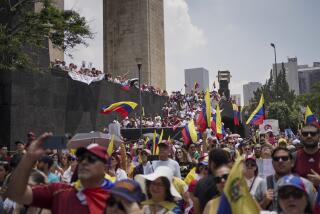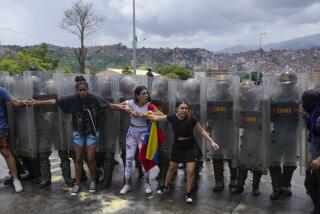Chileans Stage Fiesta to Hail Pinochet Loss
- Share via
SANTIAGO, Chile — Several hundred thousand Chileans turned out Friday for a joyous victory party, celebrating Gen. Augusto Pinochet’s defeat with songs, chants and dances including the “Waltz of the No.”
The opposition coalition hurriedly organized what it called the “Fiesta for Democracy and Reconciliation” in a park here to let people unleash emotions generated by Pinochet’s trouncing in Wednesday’s presidential plebiscite.
Spontaneous celebrations that broke out across the city on the day after the vote resulted in two shooting deaths and repeated battles with riot police.
The party in the capital’s central O’Higgins Park brought out an immense throng of jubilant families, businessmen, laborers and young people, swaying to protest songs and relaxing on a warm, sunny afternoon in the Southern Hemisphere spring. Chile’s best-known musicians entertained from a creaking wooden stage facing the crowd against the spectacular backdrop of the Andes Mountains.
The opposition estimated the crowd at about 1 million people. Chilean journalists calculated the number at more than the throng of 400,000 who turned out to see Pope John Paul II in the same park during his visit here in April, 1987. There was no independent estimate of the crowd size.
The festivities allowed the victors to set aside for a day the memories of the grinding plebiscite campaign and of the still more uncertain period ahead as the opposition tries to consolidate its gains and maintain control over its restive supporters. Some sporadic incidents were reported before and after the fiesta. Radio Cooperative, an opposition station, said that soldiers fired shotguns at a group of marchers approaching the rally, wounding several people slightly.
After dispersing several hundred demonstrators who gathered near the presidential palace during the evening, riot policemen attacked and clubbed more than a dozen photographers and cameramen working for foreign media, according to witnesses. At least eight journalists were taken to a hospital for treatment of cuts, bruises and some bone fractures.
Vows to Serve Term
Although Pinochet was defeated by a margin of 55% to 43% in the yes-or-no vote on whether he should remain eight more years in power, he vowed Thursday night that he would serve out his term as president until March, 1990. He also made clear that he rejects the opposition’s view that the outcome was a public mandate for changing the constitution to reduce the military’s far-ranging influence and speed the return to full civilian, democratic rule.
Patricio Aylwin, leader of the 16-party coalition that engineered Pinochet’s defeat, took satisfaction in noting that the crowd was far larger than those that have gathered in the park for annual Sept. 18 military parades over which Pinochet presides. The park also held a special significance for the opposition because it had been denied permission to hold rallies there during the campaign.
Aylwin said that Chileans are clearly determined to consolidate the victory by pressing the armed forces, if not Pinochet himself, to negotiate changes in the system.
“The No is united and has the strength of the majority,” Aylwin told reporters below the stage, referring to the No Command, as the multi-party opposition coalition calls itself. But neither he nor the other political leaders at the party addressed the crowd--after weeks of speeches and furious grass roots organizing, this was a time for fun, for basking in the atmosphere of victory.
Chileans have a penchant for flags and banners, and every other person seemed to be waving the national flag or a party emblem. One celebrant had scrawled on his flag: “Chile Reborn!”
“Pi-NO-chet,” read another sign.
The only jeers were heard when a police helicopter circled overhead, drowning out the crowd’s favorite songs, many of which were the Spanish equivalent of 20-year-old protest ballads in the style of American folk singer Joan Baez. There were even flowers in some people’s hair.
Yet, in the occasional strident political chants, there remained a mood of determination not to lose the momentum developed during the campaign and not to let Pinochet behave as if he had won.
“There must be changes to avoid civil war. The people are calm now, but if Pinochet maintains his refusal to change, it could become like Nicaragua,” said Jaime Palma, a local labor union leader who brought his daughter to the festival.
“There must be a consensus government, as soon as possible,” he said. “The people must continue the pressure.”
Earlier in the day, Ricardo Lagos, leader of the Party for Democracy, a new, leftist political organization, said that the opposition will talk more seriously about strategy next week. “You have to give the defeated a couple of days to recover from the shock,” he said. Lagos’ party is one of the main elements in the No Command.
While Pinochet himself dismissed the notion of negotiating changes in the 1980 constitution under which the plebiscite was held, some rightist leaders who had supported him said that the defeat carried significant weight. Sergio Onofre Jarpa, leader of the conservative National Renovation party, said that the armed forces ought to consider at least some changes in the constitution, such as those clauses that make the document virtually impossible to amend.
Such comments raised hopes among the opposition that elements may exist among Pinochet’s civilian backers to help convince the military that negotiations would be preferable to conflict.
Victor Barrueto, secretary general of the Unitary Popular Action Movement, said, “Pinochet himself is the greatest obstacle. We are counting on the armed forces’ taking the measures necessary to move that obstacle.”
Barrueto said that the margin of the opposition victory “makes talks more viable.” He also noted that the military and police had dealt relatively gently with the boisterous festivities on the day after the vote, suggesting a desire to avoid confrontation.
But Herman Correa, secretary general of faction of the Socialist Party, said that the longer Pinochet delays talks, the greater the people’s frustration will be, and the greater the danger of economic and political deterioration in the country.
Orlando Saenz, a former adviser to Pinochet who publicly supported the No Command, said that Pinochet’s speech showed the president to be “under very heavy stress--he hasn’t realized what happened. I hope the opposition will be able to make the military realize that the only option is to start political negotiations.”
But for one day, people were content to dance the “Waltz of the No,” one of the theme songs of the campaign, and to enjoy the sun. Strangers hugged each other in outpourings of feelings after 15 years of rule by Pinochet since his 1973 coup.
One poster bearing a portrait of the general that recalled the days when Pinochet wore dark glasses and a stern expression after the coup, announced boldly: “No Street Will Ever Bear Your Name.”
More to Read
Sign up for Essential California
The most important California stories and recommendations in your inbox every morning.
You may occasionally receive promotional content from the Los Angeles Times.













